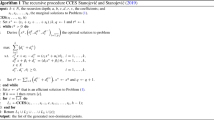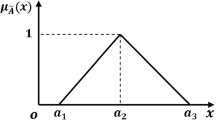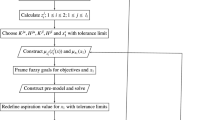Abstract
This article presents an algorithm for solving fully fuzzy multi-objective linear fractional (FFMOLF) optimization problem. Some computational algorithms have been developed for the solution of fully fuzzy single-objective linear fractional optimization problems. Veeramani and Sumathi (Appl Math Model 40:6148–6164, 2016) pointed out that no algorithm is available for solving a single-objective fully fuzzy optimization problem. Das et al. (RAIRO-Oper Res 51:285–297, 2017) proposed a method for solving single-objective linear fractional programming problem using multi-objective programming. Moreover, it is the fact that no method/algorithm is available for solving a FFMOLF optimization problem. In this article, a fully fuzzy MOLF optimization problem is considered, where all the coefficients and variables are assumed to be the triangular fuzzy numbers (TFNs). So, we are proposing an algorithm for solving FFMOLF optimization problem with the help of the ranking function and the weighted approach. To validate the proposed fuzzy intelligent algorithm, three existing classical numerical problems are converted into FFMOLF optimization problem using approximate TFNs. Then, the proposed algorithm is applied in an asymmetric way. Since there is no algorithm available in the existing literature for solving this difficult problem, we compare the obtained efficient solutions with corresponding existing methods for deterministic problems.


Similar content being viewed by others
References
Arya R, Singh P (2017) Fuzzy parametric iterative method for multi-objective linear fractional optimization problems. J Intell Fuzzy Syst 32:421–433
Arya R, Singh P (2018) Bhati D A fuzzy based branch and bound approach for multi-objective linear fractional (MOLF) optimization problems. J Comput Sci 24:54–64
Arya R, Singh P (2019) Fuzzy efficient iterative method for multi-objective linear fractional programming problems. Math Comput Simul 160:39–54
Bellman RE, Zadeh LA (1970) Decision making in a fuzzy environment. Manag Sci 17(4):141–164
Bhati D, Singh P (2017) Branch and bound computational method for multi-objective linear fractional optimization problem. Neural Comput Appl 28:3341–3351
Chakraborty M, Gupta S (2002) Fuzzy mathematical programming for multi-objective linear fractional programming problem. Fuzzy Sets Syst 125:335–342
Chang C-T (2017) Fuzzy linearization strategy for multiple objective linear fractional programming with binary utility functions. Comput Ind Eng 112:437–446
Charnes A, Cooper WW (1962) Programming with linear fractional functional. Nav Res Logist Q 9:181–186
Costa JP (2005) An interactive method for multiple objective linear fractional programming problems. OR Spectr 27:633–652
Costa JP (2007) Computing non-dominated solutions in MOLFP. Eur J Oper Res 181:1464–1475
Craven BD (1988) Fractional programming. Heldermann Verlag, Berlin
Das SK, Mandal T, Edalatpanah SA (2017) A new approach for solving fully fuzzy linear fractional programming problems using the multi-objective linear programming. RAIRO-Oper Res 51(1):285–297
Das SK, Edalatpanah SA, Mandal T (2018) A proposed model for solving fuzzy linear fractional programming problem: numerical Point of View. J Comput Sci 25:367–375
Deb M (2018) A study of fully fuzzy linear fractional programming problems by signed distance ranking technique in optimization techniques for problem solving in uncertainty. IGI Global, pp 73–115
Dutta D, Rao JR, Tiwari RN (1992) Sensitivity analysis in fractional programming-the tolerance approach. Int J Syst Sci 23(5):823–832
Ezzati R, Khorram E, Enayati R (2013) A new algorithm to solve fully fuzzy linear programming problems using the MOLP problem. Appl Math Model 39:3183–3193
Guzel N (2013) A proposal to the solution of multi-objective linear fractional programming. Hindawi Publishing Corporation Abstract and Applied Volume. Article ID 435030:1–4
Guzel N, Sivri M (2005) Taylor series application of multi-objective linear fractional programming problem. Trakya Univ J Sci 6(2):80–87
Kauffmann A, Gupta MM (1991) Introduction to fuzzy arithmetic: theory and applications. Van Nostrand Reinhold, New York
Kumar A, Kaur J, Singh P (2011) A new method for solving fully fuzzy linear programming problems. Appl Math Model 35:817–823
Liou TS, Wang MJ (1992) Ranking fuzzy number with integral value. Fuzzy Set Syst 50:247–255
Lotfi FH, Allahviranloo T, Jondabeha MA, Alizadeh L (2009) Solving a fully fuzzy linear programming using lexicography method and fuzzy approximate solution. Appl Math Model 33:1464–1475
Luhandjula MK (1984) Fuzzy approches for multiple objective linear fractional optimization. Fuzzy Sets Syst 13:11–23
Najafi HS, Edalatpanah SA (2013) A note on “A new method for solving fully fuzzy linear programming problems”. Appl Math Model 37(14–15):7865–7867
Najafi HS, Edalatpanah SA, Dutta H (2016) A nonlinear model for fully fuzzy linear programming with fully unrestricted variables and parameters. Alex Eng J 55(3):2589–2595
Pal BB, Moitra BN, Maulik U (2003) A goal programming procedure for fuzzy multi-objective linear fractional programming problem. Fuzzy Sets Syst 139:395–405
Pop B, Stancu-Minasian IM (2008) A method of solving fully fuzzified linear fractional programming problem. J Appl Math Comput 27:227–242
Schaible S (1976) Fractional programming I: duality. Manag Sci 22:658–667
Schaible S (1978) Analyse and Anwendungen von Quotientenprogrammen. Verlag Anton Hain, Meisenheim am Glan
Sharma U, Aggarwal S (2018) Solving fully fuzzy multi-objective linear programming problem using nearest interval approximation of fuzzy number and interval programming. Int J Fuzzy Syst 20(2):488–499
Valipour A, Yaghoobi MA, Mashinchi M (2014) An iterative approach to solve multiobjective linear fractional programming problems. Appl Math Model 38:38–49
Veeramani C, Sumathi M (2014) Fuzzy mathematical programming approach for solving fuzzy linear programming problem. RAIRO-Oper Res 48:109–122
Veeramani C, Sumathi M (2016) Solving the linear fractional programming problem in a fuzzy environment: numerical approach. Appl Math Model 40:6148–6164
Zimmerman HJ (1978) Fuzzy programming and linear programming with several objective functions. Fuzzy Sets Syst 1:45–55
Author information
Authors and Affiliations
Corresponding author
Ethics declarations
Conflict of interest
All the authors declare that they have no conflict of interest.
Ethical approval
This article does not contain any studies with human participants or animals performed by any of the authors.
Additional information
Communicated by V. Loia.
Publisher's Note
Springer Nature remains neutral with regard to jurisdictional claims in published maps and institutional affiliations.
Rights and permissions
About this article
Cite this article
Arya, R., Singh, P., Kumari, S. et al. An approach for solving fully fuzzy multi-objective linear fractional optimization problems. Soft Comput 24, 9105–9119 (2020). https://doi.org/10.1007/s00500-019-04442-0
Published:
Issue Date:
DOI: https://doi.org/10.1007/s00500-019-04442-0




